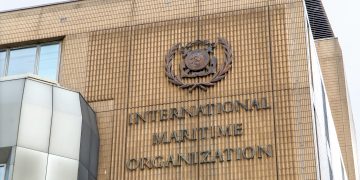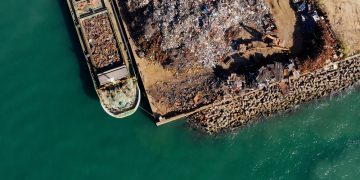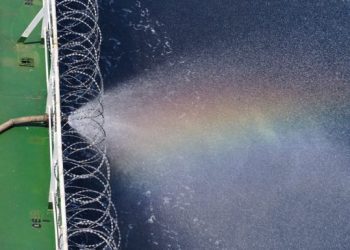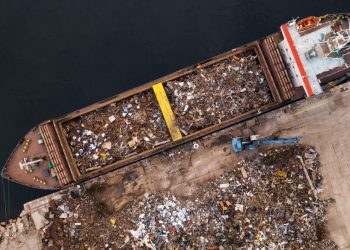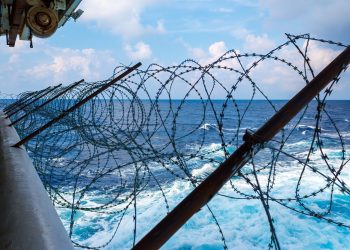Considering the attacks on merchant ships in the Gulf of Guinea by Nigerian pirates, 99 maritime companies, organisations and flag states, have signed the Gulf of Guinea Declaration on Suppression of Piracy, which was launched on May 17.
More speifically, in 2020, 135 crew were kidnapped from their ships, with the Gulf of Guinea accounting for more than 95% of the crew numbers kidnapped. The pirates launch their attacks from the Niger Delta, where they also hold their hostages.
We hope that all parties with an interest in a safe Gulf of Guinea will sign this Declaration
stated Sadan Kaptanoglu, BIMCO president and shipowner, who has personally had a ship hijacked and crew kidnapped in the Gulf of Guinea.
What is more, BIMCO also welcomed the positive steps taken by regional states, especially Nigeria. However, it added that it would take some years before these states can effectively manage the problem.
In the interim period the best solution is to have capable military assets from able and willing non-regional states to actively combat piracy in the area in support of the efforts by countries in the region
said BIMCO.
As for the signatories, they firmly believe that piracy and attempts at kidnapping are preventable through ”active anti-piracy operations and that by the end of 2023 the number of attacks by pirates can be reduced by at least 80%.” Therefore, they add that the situation is unacceptable for five reasons:
- The human toll is unacceptably high for seafarer victims either directly affected by attacks, e.g., through kidnapping, psychological trauma, or death, as well as indirectly affected by periods of stress because of the constant threat.
- The attacks are preventable taking place in a relatively small area (less than one fifth the size of the area affected by Somali piracy in 2010). An active naval force with very few assets conducting effective law enforcement could deter and suppress piracy in the Gulf of Guinea.
- Stakeholders in the region – including individual consumers, governments, and businesses – pay increased costs for shipments due to the increased cost of security for visiting merchant ships.
- Continued reliance on locally sourced commercial protection services that are under the control of the coastal States undermines incentives to carry out effective law enforcement and therefore is not a model that will genuinely repress the actions of the pirates in the region.
- The poor security situation impedes regional economic growth because it puts off investments in the ocean-based economy whereby a significant contribution to the regional economies is forfeited.
The signatories also called all stakeholders to sign this pledge and join together in a coalition to end the threat of piracy in the Gulf of Guinea through:
- Tangibly supporting antipiracy law enforcement by non-regional naval forces providing a capable incident response capability to complement regional coastal States’ antipiracy law enforcement operations;
- Enhancing regional capacity building with priority given to those coastal States which demonstrate the will to participate actively in law enforcement at sea;
- Encouraging non-regional navies to work actively together with each other and the Gulf of Guinea coastal States’ antipiracy law enforcement forces and agencies to supress the pirate threat;
- Supporting the deployment of law enforcement staff from regional coastal States on non-regional navy ships for capacity building purposes and to assist in the arrest and prosecution of pirates;
- Facilitating the implementation of effective shipboard defensive measures within the region, including via the BMP West Africa guidance and through other onboard active and passive protective measures;
- Improving domain awareness (e.g., via radars on offshore platforms) and sharing of relevant information between antipiracy law enforcement forces and agencies;
- Increasing effective law enforcement activity ashore to disrupt the underlying criminal enterprises where they are based;
- Providing prison facilities for arrested pirates (ideally in the region), and encouraging coastal States in the Gulf of Guinea to actively prosecute;
- Working towards improving the transparency between law enforcement agencies, military forces, and protection services;
- Actively conveying the messages above to relevant stakeholders.
Should these measures are applied, the signatories claim that, until 2023, no seafarers should have been kidnapped from a ship in the preceding 12-month period.
Analyzing this pressing matter, during its session from 5 to 14 May 2021, the Maritime Safety Committee of the IMO discussed Gulf of Guinea piracy. However, BIMCO believes that although development of related IMO resolutions on this topic is ”constructive and welcome”, much more remains to be done, particularly in the short term.
The launch of the Gulf of Guinea Declaration on Suppression of Piracy is therefore a timely expression of the maritime industry’s call for further action, through a wide range of collective efforts, to end piracy urgently in the Gulf of Guinea
In order to effectively combat maritime piracy, BIMCO believes that this can be achieved ”with as little as two frigates with helicopters and one maritime patrol aircraft”, which actively combat piracy in the area. For this reason, it urges non-regional countries to provide the necessary assets on a rotation basis, and that one or more states in the area support the effort with logistics and prosecution of arrested pirates.
The root causes of the piracy problem in the Gulf of Guinea can only be solved by Nigeria. An estimated 30 million people live in the Niger Delta, many under difficult conditions, and it would be naïve to think that anyone other than Nigeria can address the roots of the piracy problem. However, suppressing piracy will help our seafarers, just like it did off Somalia a few years ago. It will also establish security at sea and enable regional blue economies to prosper. Without security there can be no development
commented Carlo Cameli, Chair of BIMCO’s Maritime Safety & Security Committee.


























